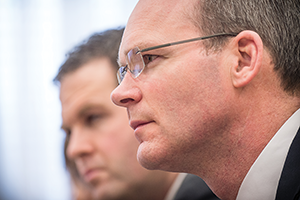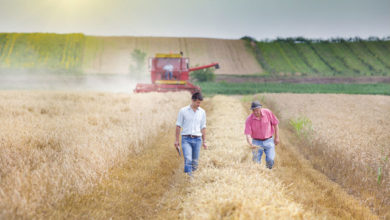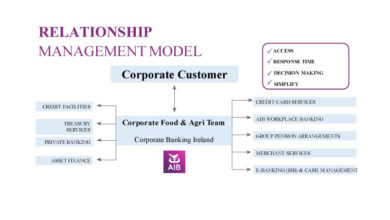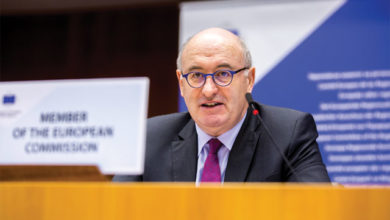Positive prospects
Writing for eolas, Minister for Agriculture, Food and the Marine Simon Coveney TD sets out the successful track record of the Irish agri-food sector and the strong reasons for confidence going forward.
One of the main drivers for the Irish economy over the past few years has been the agri-food and drink sector. Our economic recovery has been export-led and, in that context, the performance of the agri-food sector has been stellar.
It is very revealing to compare its export performance with other sectors and to realise that while merchandising exports as a whole grew by 4 per cent since 2009, food and drink exports rose by 45 per cent over the same period. I am delighted that it has performed particularly strongly during the recent economic and financial turbulence and its resilience and strength during these times has reinforced its position as our main indigenous manufacturing industry.
This is a sector which is intrinsically embedded in our economy. It uses Irish raw materials, is predominantly in Irish ownership, is widely dispersed throughout the country, and is the economic bedrock of many rural and coastal communities. It currently provides employment for around 163,000 people, and has an annual turnover of €26 billion accounting for 26 per cent of all manufacturing turnover.
The agri-food sector is of strategic importance to our national economy and this government is driving a very ambitious growth agenda for this industry. Its exports rose to a record level of €10.45 billion in 2014 and using the directed Food Harvest 2020 implementation platform, the industry is well on its way to achieving the 2020 export target of €12 billion. Our further aims are to increase the value of food production by a third over the preceding decade and to raise the value-added by 40 per cent by 2020.
Central to our burgeoning export ambition is the national opportunity which has arisen from the abolition of the EU milk quota.
Over the past few years, virtually all the major players in the sector have ramped up their capital and human investment to maximise returns from the planned 50 per cent increase in milk output. This capital investment has also been directed at moving dairy exports up the product value chain into more consumer focused areas such as infant formula, food ingredients, high value butter and nutrition products.
Similar expansionary steps have been taken at farm level. There, the emphasis has been on expanding production through capital investment, supported by targeted investment schemes introduced by my department, increased technical efficiencies and improved cost controls.
Overall, around €2 billion has been invested by dairy stakeholders in a wide range of investments so that they, as individuals, can capitalise on this once in a lifetime opportunity, while the national vision is be the world’s fastest growing dairy producer in the medium-term.
Market access
Likewise, our meat sectors are continuing to show strong signs of improvement and are an integral part of our agri-food economy. Our beef exports in 2014 rose to €2.2 billion and so far this year we have secured market access to both China and the US – the two largest beef markets in the world. We are the only EU member state to secure access to these markets reflecting the quality and reliability of our beef output.
Like dairy, developments at farm level will be crucial to this sector in the coming years which is why the Government is rolling out a comprehensive suite of on-farm investment supports, as well as committing some €300 million to fund a genomics programme under Ireland’s Rural Development Programme 2014-2020. This programme will mark Ireland as a world leader in the use of genomics for breeding and will ensure that Irish beef farmers will have access to cutting edge breeding information which can drive genetic gain on farms and ultimately lead to improved farm profitability.
Our Rural Development Plan also has a number of other initiatives which will lead to significantly increased technology transfer particularly at farm level. We are introducing knowledge transfer groups, for farmers in the beef, sheep, dairy, tillage, poultry and equine sectors. Funding of €100 million over the period of the programme will be made available under this measure. It will feature approximately 27,000 farmers, all of whom will be focused on developing farm improvement plans which will deliver measurable efficiencies in how they operate.
Little-used approaches to farming such a minimum tillage, catch-crops and new low-emission slurry spreading are being pioneered through the new €1.4 billion agri-environment scheme, Glas, which aims to ensure that the development of the sector as a whole takes place in a framework which recognises the importance of sustainability.
The newly reformed Common Agricultural Policy provides the framework for the next decade. The drive for expansion, greening and income support resonates with the work currently underway by the Agri-Food Strategy 2025 Committee. The agri-food sector is entering a period of change and it is vital that the optimum strategy is identified to meet the challenges ahead and embraces this major opportunity for growth and expansion.
The Agri-Food Strategy sets out the key actions required to maximise the contribution of the sector to economic growth, job creation and environmental sustainability over the next decade. I am confident that we can deliver on these actions and that a great future lies ahead for the Irish agri-food sector.







